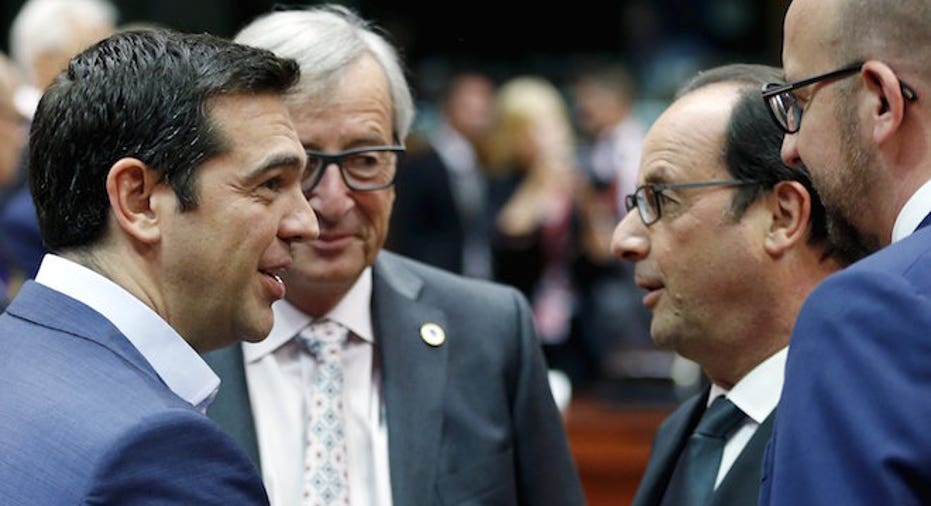Greece's Syriza Party Splits

Greece's governing Syriza party split on Friday as rebels against Prime Minister Alexis Tsipras's bailout deal with Europe decided to form a new movement to fight elections expected in September.
The breakaway by 25 out of Syriza's 149 members of parliament completes a divorce that has been on the cards since July, when Mr. Tsipras agreed to the austerity-heavy terms of Greece's European creditors, despite his party's long-standing campaign to end austerity.
Mr. Tsipras resigned as premier late Thursday, in a bid to trigger snap elections in late September and return to power with a new-look Syriza that is more likely to support him as he implements the bailout agreement. The dissident lawmakers, who have withheld support for Mr. Tsipras in recent votes on measures to secure the bailout deal, announced on Friday that they would form a new party called Popular Unity that will run against Syriza in next month's elections.
Greece's head of state, President Prokopis Pavlopoulos, is expected to appoint a caretaker government soon to take the country to elections. But before that appointment, the president has to give opposition-party leaders the chance to form a new governing majority. No alternative majority excluding Syriza is plausible, but the constitutionally required procedure could drag on for days.
On Friday, Mr. Pavlopoulos mandated the head of Greece's conservative New Democracy party, Evangelos Meimarakis, with the task of forming a government. Mr. Meimarakis will have up to three days to muster a majority. After him, a second opposition leader will be given the chance to form a majority. It was unclear on Friday whether that would be the head of fascist movement Golden Dawn, or the leader of the new Popular Unity movement, Panagiotis Lafazanis.
The legally required procedure is unlikely to prevent elections, but depending on how long it takes, it might force the elections to be delayed until after Mr. Tsipras's proposed date of Sept. 20.
Mr. Lafazanis was the Syriza-led government's energy minister until July. His hard-line opposition to concessions to Greece's creditors made him a thorn in Mr. Tsipras's side during the recent months' tough bailout negotiations. Mr. Lafazanis staunchly rejects the austerity measures demanded by lenders in exchange for aid. Some other members of the new Popular Unity group argue that the country needs to leave the euro to end its economic crisis.
In Popular Unity's first news conference, Mr. Lafazanis claimed to represent the majority of Greeks who voted against the creditors' bailout terms in a July 5 referendum, only to see the government sign a similarly tough bailout deal a week later. "For us, the "no" vote in the referendum has not been defeated," Mr. Lafazanis told reporters. "The 'no' vote will not be an orphan in the elections."
Popular Unity proposes scrapping Greece's bailout agreement and opposes repaying the majority of Greece's debt, Mr. Lafazanis said. "If needed we will leave the eurozone in a coordinated way," he said. "The idea that the exit from the eurozone will be hell is a demonization. There are many countries outside the euro."
Mr. Tsipras's resignation, a response to the deepening rift in Syriza in recent weeks, could well lead to his re-election at the head of a more cohesive majority in parliament. Opinion polls suggest Mr. Tsipras remains easily Greece's most popular party leader, and Syriza its most popular party, despite the outgoing premier's U-turn over austerity. But Greek elections can be unpredictable affairs and many analysts say Mr. Tsipras's move is a gamble, even if he's more likely than not to win it.
European authorities have reacted calmly to Mr. Tsipras's gambit, which was well flagged in advance--unlike in late June, when Mr. Tsipras stunned Europe by calling a sudden referendum on bailout terms.
"This was not a surprise," said Annika Breidthardt, a spokeswoman for the European Commission, hinting that Mr. Tsipras had kept Commission President Jean-Claude Juncker abreast of his plans in recent phone calls. Ms. Breidthardt also said the commission wasn't worried that the polls would delay the implementation of austerity measures prescribed by Greece's new EUR86 billion ($96 billion) bailout program. "Regardless of elections, reforms can now be implemented," she said.
German Chancellor Angela Merkel also wasn't surprised by Mr. Tsipras's decision to resign and call for new elections, her spokesman Steffen Siebert said Friday. "Of course, the German government and Greece's other European partners expect the implementation of reform, the implementation of agreements as laid out in the [bailout] program," Mr. Seibert said.
(By Nektaria Stamouli and Stelios Bouras)



















